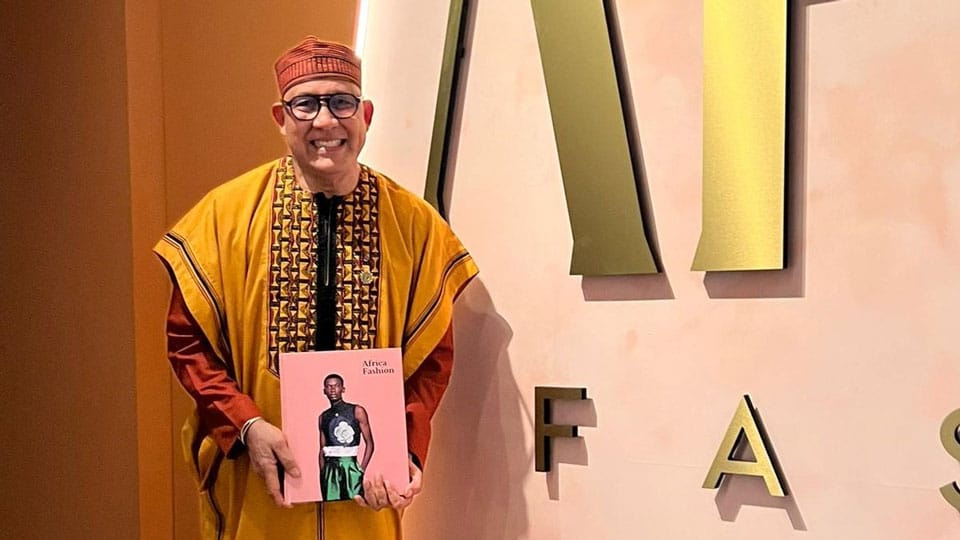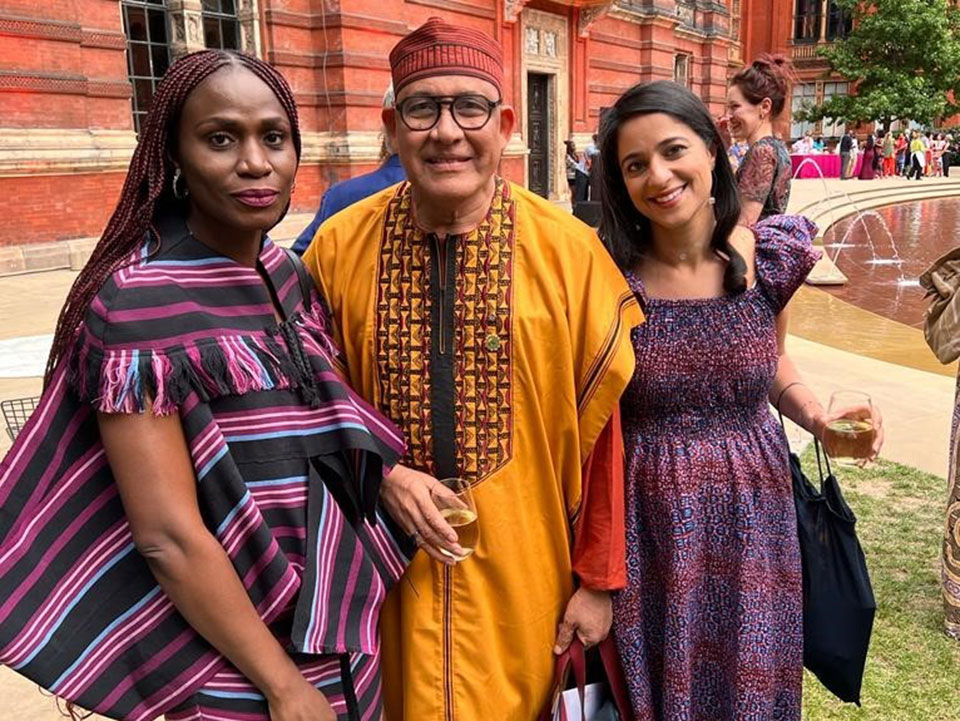CEO lessons from the “Prince of the Desert” Alphadi

Allow me to take you to Niger – landlocked with Algeria to the northwest, Mali to the west, Libya to the northeast, Chad to the east, Nigeria to the south, Benin and Burkina Faso to the southwest. I am sure each of those countries conjures up various images in your mind’s eye, but how about creativity, fashion, textiles, jewelry, riches, talent, and excitement for the future?
In fact, all of these African nations have this and more. To meet the values-driven CEO who brings it all together; Alphadi.
Despite battling the geopolitical barriers in his home nation of Niger, the now internationally-recognized designer and CEO is succeeding in breaking glass ceilings throughout the world of fashion – hard to permeate, even when you are from a Western background.
I spent time at Alphadi’s studio, showrooms, and soon-to-be school, in Niamey in Niger, where he sees and invests in pan-African talent. Sitting there I could hear music from Mali and admire fabrics from Niger, patterns from across other African countries, and designs that were world-class. Alphadi has succeeded in bringing these to the world’s fashion capitals – London, New York, Milan, and Paris.
If not now, when?
For Alphadi, one name on its own is enough for this living legend in African Fashion, and so he and others were celebrated at the Victoria & Albert Museum in London at its very first African fashion exhibition at the beginning of July 2022 – more than 170 years after it was founded – in an effort to acknowledge colonial histories and the origin of many of most precious artifacts, which have been acquired due to colonialism.
As Tristram Hunt, Director of the Victoria and Albert Museum highlighted, it was wonderful to have talent, not just showcased but physically present. Why are we celebrating African Fashion? Because it is majestic, and “if not now, then when?” asked Art Director Omoyemi Akerele who founded a fashion business development agency that focuses on the African fashion industry.
Prince of the Desert
Alphadi combines Francophone and Anglophone Africa, as one of the Tuareg people born in Timbuktu, in Mali. He moved to his parent’s native, Niger, when young, and went on to study fashion in Paris at Carson Savard Studios. It was in Paris that he met his wife, with whom he now has six children including American Footballer Nour-Eddine Seidnaly. Although he spent many years in France he tells me he regularly spends time in Africa – “I love my continent so never been out of here for more than one or two months.”
He started his own label nearly 40 years ago – in 1984, and his first haute couture line was released in 1985 at the Paris International Tourism Trade show. “I recall the director of tourism telling me I could not make fashion. So I bought a few sewing machines, began my own collection, and just took it to Paris,” he told me.
Known as the ‘Prince’ or ‘Magician’ of the desert, he has brought peace to the desert by creating the first FIMA – the International Festival of African Fashion. This event has allowed African designers to come together with other international designers including Yves Saint Larent and Jen Paul Gaulthier.
Lessons for CEOs
Bearing in mind how few high-profile black CEOs there are across the world stage, it is crucial to celebrate Alphadi as a role model for the new, more inclusive, vibrant world we hope to create.
Importantly he has been pivotal in helping the western world develop a conscience. CEOs everywhere have had to react authentically to movements such as Black Lives Matters with genuine action, or face ruin. Yet here is Alphadi, who has brought African fashion to the western world and even managed to provoke a historic institution like V&A to think differently about how they deal with the African continent.
CEOs in all industries can learn a huge amount from Alphadi’s values, resilience, creativity, and self-belief. Here are a few key lessons:
- Stand tall and proud despite how small your business is, where you come from, or how great the obstacles that hold you back. If you have something unique on offer – despite these hurdles – keep pressing forward.
- Give back, constantly thinking how to bring younger talent into your industry. Alphadi is in the process of founding a school to teach young Africans the art of fashion and textiles.
- Diversify and believe in your range of skills. Don’t only think you have to specialize in just one thing. Alphadi has been able to move seamlessly from fashion design to jewellery, bags, beauty and even painting.
- March to the beat of your own drum. Although caught in trap on not having enough investment, Alphadi still marches to his beat and has the world marching to it as well. Just because you are from a certain background, it should not stop you from pushing forward with your dreams.
- Open doors for others. Wherever you begin – whether establishing a genre, product or service – open the door for many others to walk through and don’t be afraid of competition. If many other people are interested it means you are doing the right thing.
You cannot help but be impressed by Alphadi. He is unapologetically creative – fighting the fight as a small fish in a big tank, to bring the talent of Africa to the western world.
In my books, that is something all CEOs can learn from.
Written by Dr. Mandeep Rai.
Have you read?
How to Gain a Competitive Advantage Through an Outcome Mindset by Kim Stearns.
What does employee empowerment really mean by Rebecca Houghton.
5 Global Trends that will Accelerate Hybrid Workforces by Scott Stein.
Can You #Manifest Business Success by Sedge Beswick.
Add CEOWORLD magazine to your Google News feed.
Follow CEOWORLD magazine headlines on: Google News, LinkedIn, Twitter, and Facebook.
Copyright 2024 The CEOWORLD magazine. All rights reserved. This material (and any extract from it) must not be copied, redistributed or placed on any website, without CEOWORLD magazine' prior written consent. For media queries, please contact: info@ceoworld.biz









